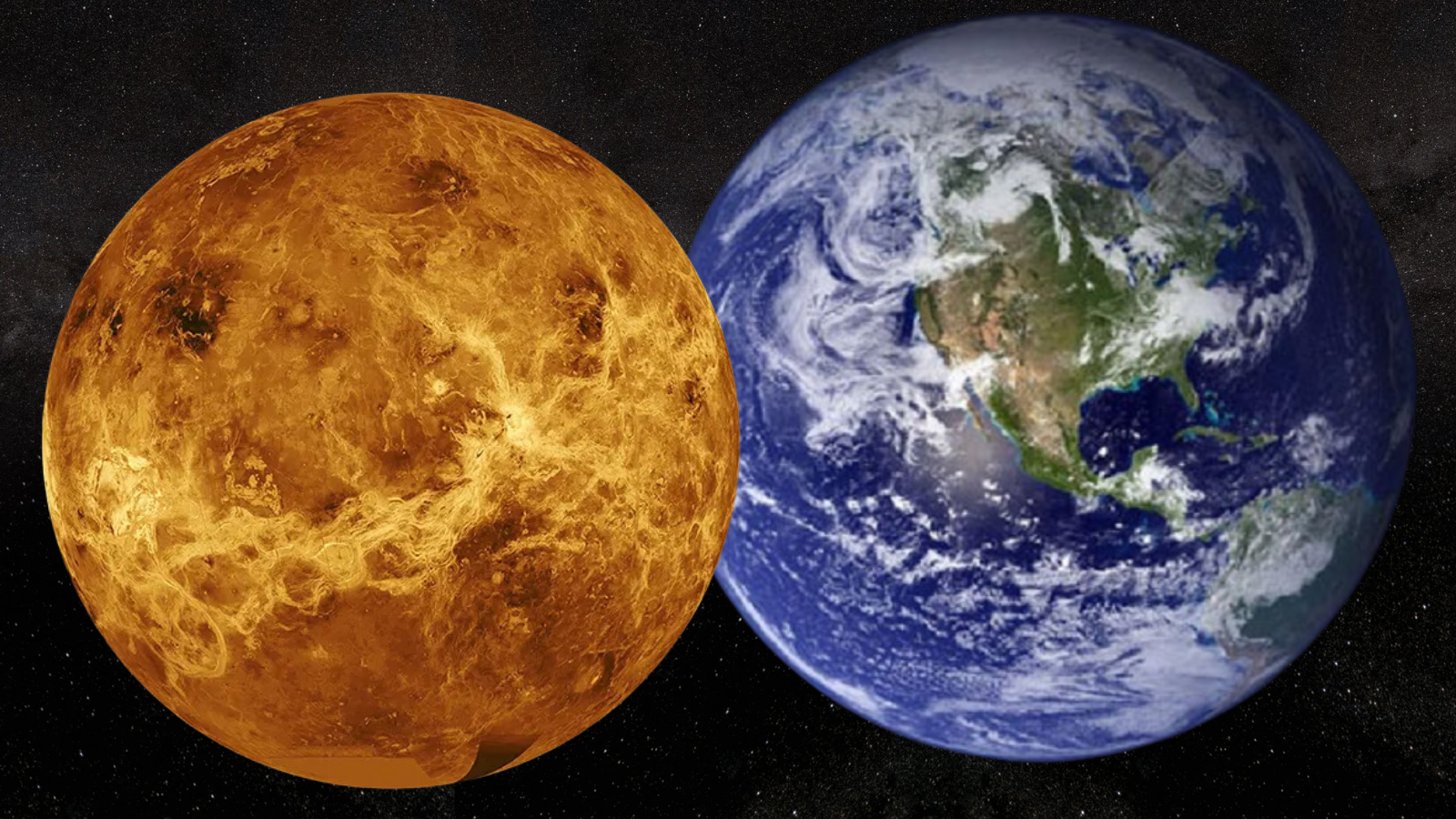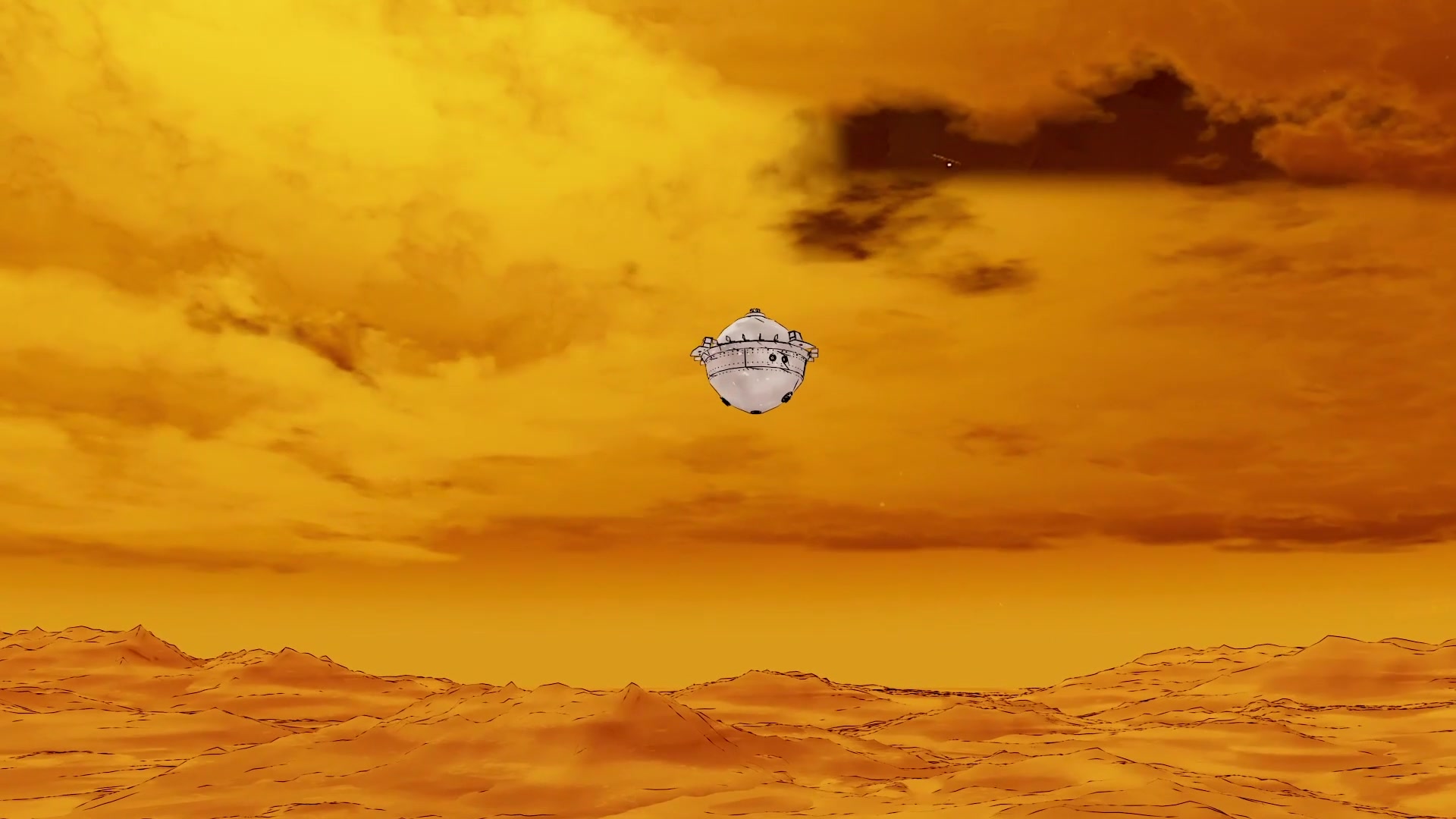How 'Earth's twin' Venus lost its water and became a hellish planet
Scientists may have identified a molecule that played a key role in robbing Venus of its water and turned this planet into the arid, hellish world we see today.
Venus is often called “Earth’s twin” because both planets are around the same size and density; they are also both rocky planets located in the inner region of the solar system. Yet, in many crucial ways, Venus couldn’t be less like Earth.
While our planet is teeming with life, Venus, the second planet from the sun, is a virtual hell. It’s the hottest planet in the solar system (even hotter than Mercury, which is closest to the sun), and has temperatures of around 880 degrees Fahrenheit (471 degrees Celsius). That’s hot enough to melt lead. Plus, Venus has quite fearsome surface pressures.
Importantly, Venus also lacks a key element for life that’s abundant here on Earth: Water. This is despite the planet being within the so-called “Goldilocks Zone” of the sun, in reference to the region around our star that is neither too hot nor too cold to allow liquid water to exist — and it’s also despite the fact scientists know Venus probably used to have water.
In fact, billions of years ago, Venus is believed to have had as much water as Earth — but, at some point in its evolution, clouds of carbon dioxide in the planet’s atmosphere triggered the solar system’s most intense runaway greenhouse effect. This sent temperatures soaring to the point they are seen today. That triggered the planet’s water to evaporate, after which it was lost to space.
Even factoring this process in, however, scientists don’t know how Venus became quite so desert-like or how it is still losing the little water it has left to space. Now, a team of scientists from the University of Colorado Boulder may have discovered the secrets of this process by telling what they call “the water story on Venus.”
“Water is really important for life,” Eryn Cangi, co-team leader and a scientist with the Laboratory for Atmospheric and Space Physics (LASP, said in a statement. “We need to understand the conditions that support liquid water in the universe and that may have produced the very dry state of Venus today.
“We’re trying to figure out what little changes occurred on each planet to drive them into these vastly different states.”
Hey, neighbor! Spare a cup of water?
To put into context the difference in water content of planetary neighbors Earth and Venus, Cangi explained that if all the water on our planet were spread evenly across its surface, it would create a global layer almost 2 miles (3.2 kilometers) deep. Doing the same for Venus, stripping the remaining water from the atmosphere would create a global layer just 1.2 inches (3 centimeters) deep.
“Venus has 100,000 times less water than the Earth, even though it’s basically the same size and mass,” Michael Chaffin, co-team leader and a fellow LASP scientist, explained in the statement.
To determine how it reached its current state, Cangi, Chaffin and colleagues used computer models of the planet, treating it almost like a gigantic chemistry laboratory. This allowed them to take an enhanced look at the diverse reactions that occur in Venus’ swirling atmosphere and identify a suspect for its water loss.

A size-by-side comparison of Venus and Earth. (Image credit: NASA/Robert Lea (Created with Canva))
What the team discovered was that a molecule called HCO+ — composed of an atom of hydrogen, an atom of carbon and an atom of oxygen — high in the atmosphere of Venus, may have been responsible for delivering the last of the planet’s water to space.
“As an analogy, say I dumped out the water in my water bottle,” Cangi said. “There would still be a few droplets left.”
HCO+ could be removing these droplets from Venus’ atmosphere, in essence. In fact, the same team has previously suggested that HCO+ was also the culprit that caused Mars, Earth’s other neighbor, to lose its water.
The researchers say HCO+ is produced constantly in the Venusian atmosphere, but that these ions don’t survive for long. An ion is a positively or negatively charged molecule, having earned its charge due to either lacking some electrons necessary to balance the positive charge of its protons, or having extra electrons to create a net negative charge in the molecule.
HCO+ lacks the electrons needed to balance the positive charge of the molecule’s protons, and is thus positively charged (hence the + symbol).
Electrons in Venus’ atmosphere rapidly recombine with HCO+, causing the molecule to split into two. From there, the team argues that the hydrogen atoms zip away and possibly even escape into space. Hydrogen atoms form two of the components of the water molecule (H2O), which is composed of two hydrogen atoms and one oxygen atom, so this therefore robs Venus of the primary ingredients of water.
The team thinks that, for Venus to have reached its extreme dry state, the planet must have had an excess of HCO+ molecules in its atmosphere.
“One of the surprising conclusions of this work is that HCO+ should actually be among the most abundant ions in the Venus atmosphere,” Chaffin said.

An illustration of the DAVINCI mission’s probe dropping through the atmosphere of Venus. (Image credit: NASA’s Goddard Space Flight Center)
However, there is a big stumbling block to this conclusion. Thus far, we’ve never seen HCO+ in Venus’ atmosphere.
Chaffin and Cangi don’t think that’s because the molecule isn’t there, however, but rather because humanity has lacked the instruments needed to see it. Though Earth’s neighbor Mars has been visited by many spacecraft from Earth, few missions have popped in on our other neighbor Venus — and none of those had the right equipment to see HCO+.
But a number of future space missions are setting their sights on Venus. NASA’s Deep Atmosphere Venus Investigation of Noble gases, Chemistry, and Imaging (DAVINCI) mission is a particularly important one. Set to launch in 2029, DAVINCI will drop a probe through the scorching hot atmosphere of Venus to determine the world’s chemical composition.
Yet, even DAVINCI won’t have the right equipment to detect HCO+.
Still, the team hopes a general interest in Venus will arise thanks to DAVINCI (and the European Space Agency’s upcoming mission EnVision), ultimately leading to a space mission that is indeed capable of detecting HCO+, thus adding veracity to the team’s water-loss story.
“There haven’t been many missions to Venus,” Cangi concluded. “But newly planned missions will leverage decades of collective experience and a flourishing interest in Venus to explore the extremes of planetary atmospheres, evolution and habitability.”
The team’s research was published on Monday (May 6) in the journal Nature.
